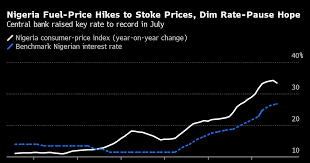A 45% hike in the pump price of gasoline and a continued downward pressure on the naira dampened hopes that the Central Bank of Nigeria will press pause on an interest-rate increase at a meeting this month.
State-owned Nigerian National Petroleum Co. raised gasoline prices to 897 naira ($0.56) a liter on Tuesday, according to price display boards in three different NNPC-operated retail stations in Abuja, the nation’s capital.
That’s amid acute scarcity of the fuel that has caused long queues at gas stations and slowed economic activity in the West African nation after the NNPC said that its debt to oil traders — which media reports put at about $6 billion but the company denies — has strained supply. NNPC says the government owes it 7.8 trillion naira ($4.9 billion).
Transporters have responded to the fuel-price increase by doubling fares in Lagos, the nation’s commercial hub, raising fears of renewed pressure on inflation. Annual consumer-price growth slowed for the first time in two years in July to 33.2% from 34.2% a month earlier, an almost three-decade high.
The central bank has raised its key rate by 15.25 percentage points since 2022, taking it to a record 26.75% in July. The Abuja-based bank’s monetary policy committee next meets Sept. 23 and 24.
“We think that a broader shift toward monetary easing may be premature this year despite inflation trending lower,” Ayodeji Dawodu, an analyst at BancTrust Investment Bank Ltd., said by email. Cutting the rate “could deter much-needed foreign currency inflows and induce pressure on the exchange rate,” he said.
Pressure on the naira — which weakened to an almost five-month low of 1,625.88 per dollar Wednesday — has heightened inflation concerns. This brings the currency’s year-to-date loss against the US currency to 43%, the worst performer globally after Ethiopia’s birr and the Lebanese pound.
Central bank Governor Olayemi Cardoso has emphasized in several meetings that policymakers are committed to defeating inflation, but indicated in July that the key rate could come down in the not-too-distant future if price pressures moderated.
New petrol prices “are pointers to the high possibility of a rise in inflation figures” because of transport and commodities costs, Segun Ajayi-Kadir, director-general of the Manufacturers Association of Nigeria, said by email. “Consumers will spend more on transportation and energy, leaving them with less disposable income.”
Source:norvanreports.com

